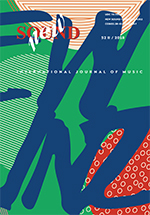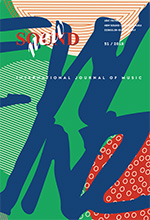Issue No. 51
Conversations
Jelena Novak – MUSIC THAT KNOWS WHERE IT’S GOING. Conversation with Tom Johnson
Download: ser / eng
Studies
Nice Fracile – THE PHONOGRAPHIC RECORDINGS OF TRADITIONAL
MUSIC PERFORMED BY SERBIAN PRISONERS
OF WAR (1915 –1918)
Abstract: This paper will focus on an examination of the phonographic recordings of
traditional music, as performed by Serbian war prisoners during World War One (1915–1918) in the German camps of Königsbrück and Parchim. These recordings of traditional
Serbian songs and instrumental tunes were made on the spot by the German researcher
Georg Schünemann. This is a unique and outstandingly valuable source – in terms of
quantity, quality and scientific approach – providing material about Serbian folklore from
the early 20th century. The author of this paper will examine the basic poetic/musical
features of that material, the difficulties in deciphering the recordings and the identification of the informants, and also the continuity and changes in the style of performing
those songs and instrumental tunes, which can still be heard sung and played in Serbia
– in comparison to the musical folklore material from the early 20th century. Moreover,
the significance and current relevance of the material for Serbian ethnomusicology will
be highlighted, considering the fact that it has not been accessible to the scholarly public
so far.
Keywords: phonographic recordings, wax cylinders, Serbian prisoners, German camps,
Königsbrück, Parchim, poetic/musical features, dactylic form, heterometric and heterorhythmic structure.
Download: ser / eng
Ivana Vesić, Vesna Peno – THE STRUCTURAL TRANSFORMATION OF THE SPHERE OF
MUSICAL AMATEURISM IN SOCIALIST YUGOSLAVIA:
A CASE STUDY OF THE BEOGRADSKI MADRIGALISTI CHOIR
Abstract: In this paper we focused on investigating how the sphere of musical amateurism functioned in Yugoslavia in the decades following the end of WWII. Observing
through changes in the role and significance of amateur music ensembles, specifically
choirs, in Yugoslav society from the late 1940s until the late 1960s / early 1970s that were
manifest in their de-massification, gradual professionalisation and extensive use in cultural diplomacy, we sought to explain that this involved multiple factors – above all, the
shifts in Yugoslav international policy after the confrontation with the Soviet Union in
1948, and, consequently, the revisions of its cultural policies. Their influence was observed through a detailed examination of the activities of the Beogradski madrigalisti choir, from its foundation in 1951 until the late 1960s / early 1970s. Although it was
unique among Yugoslav choirs in many respects, the early history of this ensemble clearly
reflected the demand for excellence in the sphere of amateur performance from the 1950s
onwards, one of the most prominent indicators of its deep structural transformation.
Keywords: musical amateurism, choral performance, socialist Yugoslavia, cultural diplomacy, Beogradski madrigalisti choir, professionalisation
Download: ser / eng
Bogumiła Mika – MUSIC OF KAROL SZYMANOWSKI IN THE INTERTEXTUAL
DIALOGUE
Abstract: In this paper I delineate how two aspects of the music of Karol Szymanowski
– subjective and objective – enter into intertextual dialogue with other musical pieces.
The subjective aspect of intertextual dialogue is defined as Szymanowski’s use in his own
music of fragments of the works of various composers and of folk music. The objective
aspect of intertextual dialogue is defined as citations from or allusions to Szymanowski’s
work by other Polish composers. The problem of intertextuality in music remains important when considering participation of a single musical work in ‘the world of musical art’ in general, as well as in the world of common human experience.
Keywords: Karol Szymanowski, intertextuality, quotations, borrowing, references, stylisation
Download: ser / eng
Interpretations
Geraldine Finn – PANIC AT THE PROMS (perhaps the explanation lies in his background)
Abstract: This paper has been written as both a celebration of the music of Harrison
Birtwistle – “the most forceful and uncompromisingly original British composer of his
generation” according to the New Grove Dictionary of Music and Musicians – and as a
response, at once playful and polemic, to the critics and commentators who struggle to
name, claim, frame and contain it within the familiar categories and tropes of contemporary music interpretation. My particular focus is Panic which is exemplary in this respect
and what Birtwistle cognoscendi have a habit of referring to as ‘his background’ to ‘explain’ the idiosyncratic difficulty and difference of his work, as in the quotation cited as
my subtitle.
Keywords: Birtwistle, background, jingoism, panic, Proms
Download: ser / eng
Tribute to prof. Dr. Roksanda Pejović
Ivana Perković – NARRATIVE MONOLOGUE AND (INTERNAL) DIALOGUE:
IN MEMORY OF ROKSANDA PEJOVIĆ (1929–2018)
Download: ser / eng
Katarina Tomašević – A FAREWELL TO AJA: FRAGMENTS OF MEMORIES
Download: ser / eng
New Works
Bojana Radovanović – WHAT DOES THE HUMMING AVATAR REMEMBER?
COMPOSER’S VOICE AND MEMORY IN
ANA GNJATOVIĆ’S PHONATIONS
Abstract: Written as a two-fold dissertation on Ph.D. studies of composition at the Faculty of Music in Belgrade, which consists of the piece and the autopoetic text, Ana Gnjatović’s Phonations for voice and electronics (2016), raises, among others, questions of
performance of music for voice and electronics, as well as issues of the composer’s/performer’s voice, and the topic of (musical) memory. Focusing on these problem points, this
paper deals with Ana Gnjatović’s ‘vocal identity’, represented and performed in the layering sounds of voice and electronics, with Edward T. Cone’s notion of ‘composer’s voice’ in mind.
Keywords: Phonations, Ana Gnjatović, composer’s voice, electrovocal music, performance
Sound example: https://www.youtube.com/watch?v=mgbJ7s-f8i4
Download: ser / eng
Olga Otašević – ‘HARMONY OF THE SPHERES’ IN THE MUSICAL ‘VITRAGE’ OF THE THIRTEEN-STAR FLOWER OF CASSIOPEIA: MICROAND MACRO-MANIPULATION WITH TIME AND SPACE
Abstract: This paper deals with an analysis of the phantasy for orchestra Trinaestozvezdani cvet Kasiopeje [The Thirteen-star Flower of Cassiopeia] by Vladimir Trmčić
(1983). Special attention is paid to the motivic analysis of the work and general aesthetical
premises of the program, which influenced the formation of the musical flow. The static
nature, sustained tones and micropolyphony enable the composer to experiment with time,
space, intervals, timbres, resulting in music with an immanent logic guided by the movement of energy masses.
Keywords: Vladimir Trmčić, symphonic phantasy, music time, music space, cluster
Sound example: https://www.youtube.com/watch?v=OKBa4wqrI-s
Download: ser / eng
Analytical Perspectives
Dragan Latinčić – POSSIBLE PRINCIPLES OF MATHEMATICAL MUSIC
ANALYSIS
Abstract: The text is a summary of many years of research in the domains of micro-intervals, metric-rhythmic projection of the spectrum harmonics, and the establishment of
a link with mathematics, more precisely, geometry, with a special focus on the application
of the Pythagorean Theorem. Mathematical music analysis enables the establishment of
methods for constructing right, obtuse, and acute musical triangles as well as projections
of their edges (sides), which are recognized in trigonometry as the functions of angles: the
sine, cosine, and so on; as well as the establishment of methods for constructing spectral
and scalar (intonative-temporal) trigonometric unit circles with their function graphs.
Keywords: Aristoxenus of Tarentum, Johannes Kepler, lambdoma, micro-intervals, Pythagoras, planimetrics, rhythm, spectrum, trigonometry, triangle
Download: ser / eng
Research and Tradition
Sonja Marinković – THE 80TH ANNIVERSARY OF THE FACULTY OF MUSIC IN
BELGRADE
Abstract: The text sheds light on the activities of the Faculty of Music (est. 1937), Serbia’s oldest institution of higher education in the field of music pedagogy. The aim is to
present the context in which the institution developed, changes in the structure of its study
programmes, to illuminate the dilemmas it had to negotiate while building a particular
approach to higher education in the domain of art and the study of art, focusing on the
institution’s development over the last 30 years or so.
Keywords: Music Academy / Faculty of Music in Belgrade, music pedagogy, higher education, jubilee, Serbian music
Download: ser / eng
Reviews
Ana Kotevska – Marija Bergamo, Muzikološke sledi ob
osemdesetletnici (Musicological Traces
at Eighty), Ljubljana: Znanstvena
založba Filozofske fakultete, 2017, 343
pp. ISBN 978-961-237-955-1
Download: ser / eng
Sonja Cvetković – Katarina Tomašević (ed.), Davorin
Jenko (1835–1914). Prilozi za kulturu
sećanja / Prispevki za kulturo spomina [Contributions to Cultural
Remembrance], Belgrade: Institute of
Musicology of the Serbian Academy
of Sciences and Arts, National Council
of the Slovenian National Minority in
the Republic of Serbia, 2016
Download: ser / eng
Radoš Mitrović – Nada Kolundžija, Breathing in /
Breathing Out: A Little Anthology of
Piano Music (1914–2014), Ivana
Miladinović Prica (ed.), Belgrade:
Vertical Jazz, 2017, 3Cds, 207 pp.
ISBN 978-86-86037-17-6
Download: ser / eng
Defended Doctoral Thesis
Radoš Mitrović – THE END OF POSTMODERNITY IN
EUROPEAN MUSIC AND ITS
DEPENDENCE ON SOCIOPOLITICAL AND ARTISTIC
CONTEXT
Download: ser / eng
Milan Milojković – DIGITAL TECHNOLOGY IN
SERBIAN ARTISTIC MUSICAL
OUTPUT (1972–2010)
Download: ser / eng


